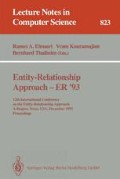Abstract
We present the uniform meta-architecture of the TIGUKAT object model and show how it provides reflection in objectbase management systems. Reflection is the ability for a system to manage information about itself and to access (or reason about) this information through the regular access primitives of the model. The TIGUKAT object model is purely behavioral in nature, supports full encapsulation of objects, defines a clear separation between primitive components such as types, classes, collections, behaviors, functions, etc., and incorporates a uniform semantics over objects. The architecture of its meta-system is uniformly represented within itself, which gives a clean semantics for reflection.
This research is supported by the Natural Science and Engineering Research Council of Canada under research grant OGP0951.
Preview
Unable to display preview. Download preview PDF.
References
P. Cointe. Metaclasses are First Class: the ObjVlisp Model. In Proc. OOPSLA Conf., pages 156–167, October 1987.
J. Ferber. Computational Reflection in Class Based Object-Oriented Languages. In Proc. OOPSLA Conf., pages 317–326, October 1989.
B. Foote and R.E. Johnson. Reflective Facilities in Smalltalk-80. In Proc. OOPSLA Conf., pages 327–335, October 1989.
A. Goldberg and D. Robson. Smalltalk-80: The Language. Addison-Wesley, 1989.
B. Irani. Implementation Design and Development of the TIGUKAT Object Model. Master's thesis, Dept. of Comp. Sci., University of Alberta, Edmonton, AB, Canada, 1993. Available as University of Alberta Technical Report TR93-10.
P. Maes. Concepts and Experiments in Computational Reflection. In Proc. OOPSLA Conf., pages 147–155, October 1987.
H. Masuhara, S. Matsuoka, T. Wantanabe, and A. Yonezawa. Object-Oriented Concurrent Reflective Languages can be Implemented Efficiently. In Proc. OOPSLA Conf, pages 127–144, October 1992.
R.J. Peters, A. Lipka, M.T. özsu, and D. Szafron. An Extensible Query Model and Its Languages for a Uniform Behavioral Object Management System. In Proc. of the Second Int'l. Conf. on Information and Knowledge Management, pages 403–412, November 1993. A full version of this paper is available as University of Alberta Technical Report TR93-01.
R.J. Peters and M.T. özsu. Reflection in a Uniform Behavioral Object Model. In Proc. of the 12th Int'l Conf. on Entity-Relationship Approach, pages 37–49, December 1993.
R.J. Peters, M.T. özsu, and D. Szafron. TIGUKAT: An Object Model for Query and View Support in Object Database Systems. Technical Report TR92-14, Dept. of Comp. Sci., University of Alberta, Edmonton, AB, Canada, October 1992.
Author information
Authors and Affiliations
Editor information
Rights and permissions
Copyright information
© 1994 Springer-Verlag Berlin Heidelberg
About this paper
Cite this paper
Peters, R.J., özsu, M.T. (1994). Reflection in a uniform behavioral object model. In: Elmasri, R.A., Kouramajian, V., Thalheim, B. (eds) Entity-Relationship Approach — ER '93. ER 1993. Lecture Notes in Computer Science, vol 823. Springer, Berlin, Heidelberg. https://doi.org/10.1007/BFb0024355
Download citation
DOI: https://doi.org/10.1007/BFb0024355
Published:
Publisher Name: Springer, Berlin, Heidelberg
Print ISBN: 978-3-540-58217-5
Online ISBN: 978-3-540-48575-9
eBook Packages: Springer Book Archive

